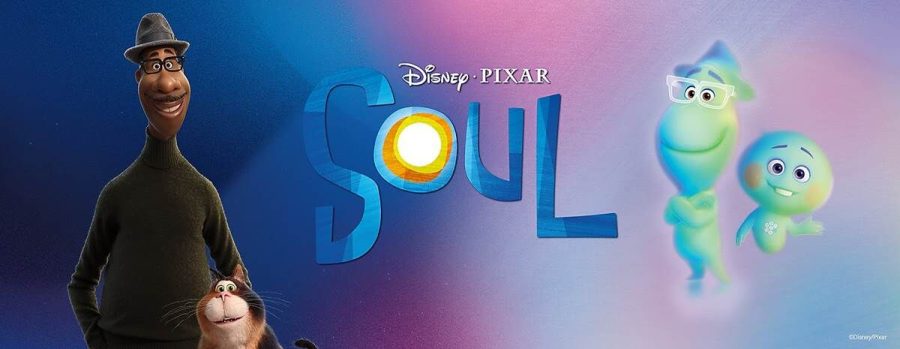Pixar’s Heart and “Soul”
Pixar’s Heart and “Soul”
January 6, 2021
Movies, and the movie industry, have suffered throughout the vast majority of the year. Theater closures and production delays have plagued the slate of films to be released in 2020. In particular, major studios’ blockbusters have been pushed back time and time again, with some, such as Dennis Villaneuve’s “Dune” and Matthew Vaughn’s “The King’s Man” rolling over into 2021. However, this past December, major studios like Warner Bros. and Pixar turned to streaming services in order to release their delayed films. On December 25th, “Soul” became the first Pixar movie to not be released in theaters, but instead on the streaming service of its parent company, Disney+. Despite the animated film not receiving the same glamorous release as its siblings in the Pixar lineup, it boasts both critical and audience acclaim, and more importantly, it’s a movie that is delivered with an abundance of heart.
The true narrative of the film doesn’t begin until the protagonist of the story, Joe Gardener (voiced by Jamie Foxx) dies. Rest assured, as much as it may seem like it, this is not a spoiler; though it marks a strange starting point for any story, Gardener’s death and the events surrounding it are essentially the premise of the film. While this may seem morbid for a family-friendly animated product of Pixar, it’s no more macabre than the studio’s after-life obsessed “Coco” or the tear-jerking opener to “Up.” While it may reside in the upper echelon of mature Pixar films, “Soul” should pose no greater discomfort to younger audiences than the previous endeavors of the studio cited above. Such is the case, particularly, when Gardener takes the form of a fluorescent and seemingly cotton-candy-textured soul in the afterlife, which is referred to here as “The Great Beyond.” It is however, in “The Great Before,” a place where souls are given their personalities before moving on to life, that Gardener meets 22 (Tina Fey). While most souls in “The Great Before” are eager to find their personalities, 22 is vehemently against it. Despite teachings from a surplus of now deceased prolific figures, 22 has remained in a state of non-existence for millenia. However, due to a series of mishaps, Gardener, a music teacher with big dreams and little success, must help the resistant 22 find her spark.
For the sake of not revealing any true spoilers of the movie, the story’s further levels of intricacy, such as additional, greater, mishaps and a point of conflict between Gardener and 22 won’t be delved into here. As a whole though, the story does remain strong throughout. The movie changes pace in a major way more than once within its duration; something that can be jarring for a moment before the audience accepts the narrative’s new direction. Still, the movie manages to feel balanced throughout, and at the very least, much more so than it should be in theory. The cohesion of “Soul” is likely the result of prominent themes that overlay the actual happenings of the characters in the story. Almost like a spiritual successor to Docter’s masterpiece, “Up,” “Soul” delivers a very human story with questions of existentialism and identity. Both of which are hard questions to grapple with in a family movie, though the capable and talented hands at Pixar deliver these concepts to children with an awe-inspiring sense of approachability. The easily comprehensible nature of the film, for all audiences, can in part be attributed to the comedy that is sprinkled into the story. There is a fair amount of humor present in the feature, and while it isn’t the funniest film in the studio’s lineup, when a joke hits, it hits hard.
Aside from the narrative, like most other Pixar movies, the film shines in regards to its animation. The style of “Soul” is interesting but doesn’t veer too far from the modern day animation standard of Disney and Pixar. That being said, particularly in “The Great Beyond” and “The Great Before,” there are some rather striking images that make for wonderfully cinematic moments. The entirety of the picture is beautifully rendered and movement is seamlessly fluid; something which is especially impressive when watching Gardener’s fingers dance across piano keys.
Similarly to the animation of the film, it would be remiss to not address the movie’s score, especially for a story that plays upon music so heavily. The score features various artists. Jon Batiste delivers the jazzy and blues-centric sounds of Earth, while Trent Reznor and Atticus Ross create the spacey hums and chimes of the eschatological worlds. While this approach to the movie’s music is clever and well executed, the score unfortunately never feels like more than a peripheral to the story. Though this isn’t an end-all flaw for “Soul”, it does feel like a missed opportunity to not make the score more central to the film.
Despite minor concerns, “Soul” is a major win for Pixar. Since the studio’s birth with “Toy Story”, it has solidified itself as a powerhouse in the world of animated movies. In response to that success, it seemed as if the studio had continued on to reproduce their success by rehashing concepts in an abundance of sequels and spin-offs. While this by no means marked the monetary death of Pixar, it did seem to allude to a death in the quality of their work. Naturally there have been some exceptions to this trend in recent years, but for the most part nothing has truly breathed fresh air into the studio’s works… until now. If Pixar was approaching its creative death, then “Soul” is the ultimate death and rebirth for the studio. “Soul” carries with it a heart and sense of hope that is perhaps unmatched by any other project from Pixar. The movie is a must watch, and like its namesake, “Soul” recaptures the soul of what once makes Pixar great.


